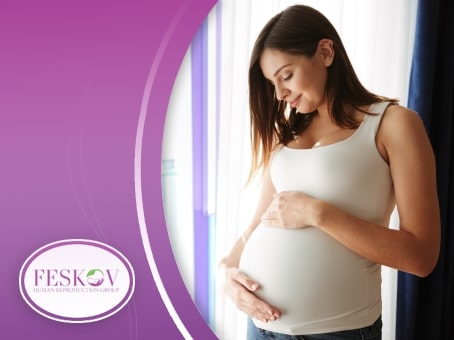
Women's Age And Fertility

When planning future motherhood, women resort to various strategies. Pregnancies are planned taking into account the most fertile age for women, oocytes are frozen at the age at which women are most fertile, women initially consider motherhood at a late reproductive age using the services of a surrogate mother.
- Women's age and fertility: fertility by age
- Women's age and IVF: chances of pregnancy depending on age
- Women's age and pregnancy complications
- Men's age and fertility
- Where to get help
Pregnancies are planned taking into account the most fertile age for women, oocytes are frozen at the age at which women are most fertile, women initially consider motherhood at a late reproductive age using the services of a surrogate mother.
Most women dream of natural motherhood, so they are actively interested in female fertility by age. In this material, we will consider the dependence of fertility on a woman’s reproductive age, at what age women are most fertile, the chances of pregnancy depending on age, and also analyze the effect of age on male fertility.
Women's age and fertility: fertility by age
A woman is born with a supply of eggs that is given to her for the entire life. Throughout the entire reproductive period until menopause, oocytes, along with the entire body, are exposed to harmful environmental influences and suffer if a woman has bad habits. There is a gradual decrease in the quantity and quality of eggs, which determines female fertility by age.
 Age is the main factor influencing a woman’s ability to bear and give birth to a healthy child. Of course, women of advanced reproductive age can become pregnant and give birth to healthy children, but the chances of becoming pregnant vary greatly depending on age.
Age is the main factor influencing a woman’s ability to bear and give birth to a healthy child. Of course, women of advanced reproductive age can become pregnant and give birth to healthy children, but the chances of becoming pregnant vary greatly depending on age.
Probability of pregnancy depending on age of a woman:
- from 20 to 30 years - 25-30% in each monthly cycle (chance of pregnancy - 90-95%);
- from 30 to 35 years - 15% in each monthly cycle (chance of pregnancy - 80%);
- from 35 to 40 years - 10% in each monthly cycle (chance of pregnancy - 75%);
- from 40 to 45 years - 5% in each monthly cycle (up to 90% of eggs have an abnormal set of chromosomes);
- from 45 years old - 1% in each monthly cycle (almost all oocytes contain an abnormal set of chromosomes).
As you can see, the chances of getting pregnant depending on age vary quite a lot to clearly state that a woman’s age has a strong influence on her fertility. Late reproductive age increases the likelihood of seeking the services of a surrogate mother and egg donor for the birth of a healthy child.
Women's age and IVF: chances of pregnancy depending on age
There is also an opinion among women that the likelihood of pregnancy depending on age can be ignored when planning IVF. However, as with natural pregnancy, fertility also varies greatly by age.
Chances of getting pregnant with IVF depending on age (after one full cycle with one ovarian stimulation and transfer of fresh or cryopreserved embryos):
- from 30 to 34 years old - 43%;
- from 35 to 39 years old - 31%;
- from 40 to 44 years old - 11%.
Moreover, the chances of pregnancy, depending on age, are higher if a woman of older reproductive age uses her own oocytes, frozen at the most fertile age for women (20-30 years), or donor oocytes for transfer.
Women's age and pregnancy complications
In addition to taking into account information about at what age women are most fertile, when planning a pregnancy at an older reproductive age, it is necessary to take into account the increasing likelihood of complications during pregnancy.
The risk of chromosomal abnormalities in the fetus, as well as spontaneous abortion, increases from age 35.
Conditions that can affect a woman's fertility at any age include endometriosis and polycystic ovary syndrome.
Women of older reproductive age are more likely to encounter complications such as gestational diabetes, placenta previa, and stillbirth.
Also, when postponing pregnancy until a later reproductive age, a woman should understand that the likelihood of using surrogacy also increases to overcome possible problems with gestation.
Men's age and fertility
When addressing the topic of pregnancy planning, in addition to the age at which women are most fertile, it is worth considering the influence of a man's age on the likelihood of pregnancy and the health of the child
Male fertility usually declines between the ages of 40 and 45, which is reflected in a decrease in sperm quality. Increasing a man's age reduces the chances of pregnancy in general, increases the time required to achieve pregnancy, and increases the risk of miscarriage and intrauterine fetal death.
Relatively rare, but there is still a tendency for an increased risk of mental disorders in children born to older fathers. Children of fathers aged 40 years and older are 5 times more likely to develop autism spectrum disorder than children of fathers under 30 years of age. Children born to men of advanced reproductive age also have a slightly higher risk of developing schizophrenia and other mental disorders in adulthood.
Our Customer Service Representatives are eager to help you with whatever you need.
Where to get help
When planning a pregnancy, a woman should not miss the moment indicating the need to contact a fertility specialist. So, if the expectant mother is between 20 and 35 years old, you should consult a doctor if pregnancy does not occur within 1 year of regular sexual activity without contraception. A woman over 35 years old should consult a fertility specialist after 6 months of unsuccessful attempts to become pregnant.
After collecting your medical history and consultation, your fertility specialist will prescribe a series of tests to evaluate your fertility and develop a strategy for achieving pregnancy in your individual case. Among other things, you will be asked to donate blood for Anti-Mullerian hormone and undergo an ultrasound to assess ovarian reserve and endometrial health - key factors important for achieving pregnancy.
Whatever the results of the examinations, do not give up - there will definitely be a child, just in some cases it will take a little more effort, which is definitely worth it.
- Surrogate motherhood - how not to be deceived
- The cost of parenthood: an overview of reproductive programs from leading clinics
- Advantages of guaranteed surrogacy programs over programs with guaranteed compensation
- Disadvantages of Egg Donation - Only Truth about the Procedure
- Unique Cases of Giving Birth to Children
- Egg donation near me
- How the History of Surrogacy Changed Over the Years
- Why I Chose Surrogate Motherhood with Feskov
- Foods to boost your fertility
- The First Meeting: 5 Helpful Tips for Surrogates & Intended Parents
- Pregnancy After Miscarriage: Getting Pregnant
- Surrogacy in Ukraine: Legal Aspects
- Alcohol And Fertility: Drinking While Trying To Conceive
- Embryo evaluation: understanding embryo quality assessment
- Historical Changes to Surrogate Laws in Israel
- TOP 5 surrogate clinics in Ukraine
- International Surrogacy Program Ukraine-Canada
- Why is surrogacy so expensive — what do you pay for
- 15 facts about Surrogacy
- Egg donation in Canada
Join my mailing list to receive the latest news and updates
What are some common misconceptions about fertility and age that need to be addressed?
read moreThe two most common misconceptions about age and fertility: with age, fertility decreases only in women (no, male fertility also decreases after 40 years) and the possibility of overcoming the influence of age on fertility by turning to IVF (no, with IVF a woman's age also strongly influences the successful achievement of pregnancy).Can lifestyle changes improve fertility in older women?
read moreLifestyle changes will not help improve the fertility of a woman of late reproductive age, because it is hormonally determined. The only thing that a lifestyle change will help is to improve well-being during pregnancy, reduce the risk of some pathologies associated with poor nutrition, bad habits and etc.What are the risks of postponing pregnancy as women age?
read moreDecreased fertility (the ability to conceive and carry a child), increased risk of chromosomal abnormalities in the fetus, miscarriage and stillbirth, higher risk of pregnancy complications.What options are available for women concerned about their fertility as they get older?
read moreThe most important thing is to contact a fertility specialist as early as possible (after a year of unsuccessful attempts to conceive before the age of 35, after 6 months - at the age of 35+ years. Even if fertility is reduced, it is possible to become a mother with the help of IVF, surrogate motherhood, oocyte donation, embryo adoption.
